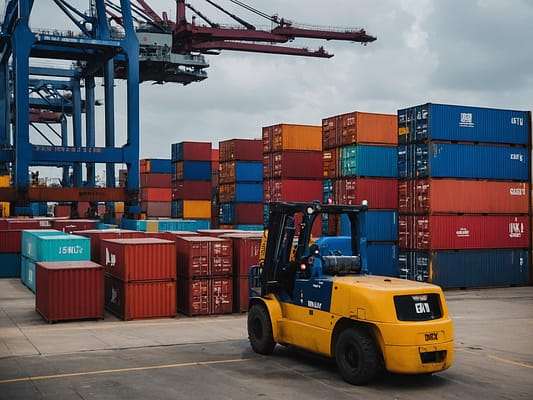The Benefits and Challenges of Establishing Local Partnerships in International Trade
Did you know that companies that establish local partnerships in new markets see a 40% higher success rate? Imagine entering a bustling market in Southeast Asia, armed with only a dream and a product. You’re excited but unsure of the terrain. This was the reality for a North American electronics company until they found a local partner who transformed their journey into a success story. At TradeLink Solution, we believe that the heartbeat of success lies in forging meaningful local partnerships. These relationships are more than just strategic moves; they are bonds built on trust, respect, and a shared vision for growth. Let’s explore how these connections can transform your business, delving into both the pros and cons to provide a balanced perspective.
Enhanced Market Entry Strategies
Pro: Entering a new market is like stepping into a new world. The excitement is palpable, but so are the uncertainties. Local partners are your guiding lights, offering a treasure trove of insights into the local business environment. They understand the pulse of the market, the regulatory nuances, and the cultural dynamics. With their guidance, you can craft strategies that resonate deeply with local audiences, ensuring a smoother and more impactful market entry.
Con: Relying heavily on local partners for market entry strategies may lead to a dependency that could stifle your own market research and understanding. It’s crucial to balance their insights with your independent analysis to avoid potential conflicts or misaligned goals.
Case Study: A North American electronics company partnered with a local distributor in Southeast Asia. The distributor’s deep understanding of the local regulatory environment and consumer preferences allowed the company to adapt its products and marketing strategy effectively. As a result, the company saw a 30% increase in market share within the first year of entry.
Practical Tips:
- Conduct thorough research to identify potential local partners with a proven track record. Learn More About Market Entry Strategies
- Ensure your values and business goals align with those of your local partner.
- Maintain regular communication to stay informed about local market trends and dynamics.
Smoother Operations and Logistics
Pro: Imagine the frustration of logistical hiccups in a foreign land. Delays, misunderstandings, and inefficiencies can be daunting. Local partners, with their established networks and expertise, become your allies in navigating these challenges. They help you identify reliable suppliers, negotiate favorable terms, and ensure your goods flow seamlessly through the supply chain. Their support transforms potential obstacles into manageable tasks, keeping your operations smooth and efficient.
Con: Entrusting logistics entirely to local partners can sometimes lead to a lack of oversight and control over processes. It’s essential to maintain a level of involvement and regularly review the operations to ensure alignment with your standards and expectations.
Example: A European fashion brand faced significant delays in shipping due to unfamiliar customs procedures in South America. By partnering with a local logistics company, they streamlined their shipping process, reduced customs clearance times by 50%, and improved overall delivery reliability.
Tips for Effective Logistics Management with Local Partners:
- Establish clear logistics protocols and performance metrics. Best Practices in Logistics Management
- Use technology to track shipments and ensure transparency.
- Regularly review logistics performance and address any issues promptly.
Strengthening Customer Relationships
Pro: Trust is the cornerstone of any successful business relationship. In unfamiliar markets, building this trust can be challenging. Local partners serve as the bridge, fostering genuine connections with customers. They understand the local culture, values, and expectations, ensuring that your business not only meets but exceeds customer needs. This personal touch leads to higher satisfaction, loyalty, and a strong brand reputation.
Con: Over-reliance on local partners for customer relationships can result in your business becoming detached from direct customer interactions. It’s important to engage with customers directly to understand their needs and build a strong brand presence.
Insight: A survey by McKinsey found that companies with strong local partnerships reported a 40% higher customer satisfaction rate. This underscores the importance of local insights in creating products and services that truly resonate with the target audience.
Practical Tips:
- Conduct regular customer feedback surveys to gather insights directly from your customers. How to Collect Customer Feedback
- Organize events and meetups to interact with customers and build relationships.
- Personalize customer service to enhance satisfaction and loyalty.
Cultural Competence and Adaptation
Pro: Every market has its unique cultural fabric, woven with distinct preferences, behaviors, and trends. Local partners are your cultural ambassadors, providing invaluable insights that help you tailor your offerings. They guide you in crafting messages that resonate, products that appeal, and services that delight. This cultural competence is key to making a lasting impression and building a loyal customer base.
Con: Cultural insights provided by local partners may sometimes be too nuanced or subjective. Balancing these insights with broader market research can help create a more comprehensive understanding and avoid potential cultural missteps.
Illustration: An American food company entering the Japanese market adjusted its product formulations based on feedback from a local partner. By reducing sugar content and introducing locally favored flavors, the company achieved rapid acceptance and significant market penetration.
Practical Tips:
- Conduct cultural sensitivity training for your team. Understanding Cultural Differences
- Engage with local communities to gain a deeper understanding of cultural preferences.
- Adapt your marketing and product strategies based on local insights.
Mitigating Risks
Pro: The global trade landscape is ever-changing, with risks lurking at every corner. Regulatory shifts, economic fluctuations, and geopolitical uncertainties can pose significant threats. Local partners offer a safety net, providing timely information and strategic advice to navigate these risks. Their local presence allows for quick, agile responses, ensuring your business remains resilient and adaptive in the face of change.
Con: While local partners can help mitigate risks, they can also introduce new ones if their interests diverge from yours or if they face their own local challenges. Regular communication and alignment on goals are crucial to managing these risks effectively.
Example: During a sudden regulatory change in India, a European pharmaceutical company relied on its local partner to swiftly navigate the new requirements, ensuring uninterrupted market access and avoiding significant financial losses.
Practical Tips:
- Develop a risk management plan with your local partner. Risk Management in International Trade
- Stay informed about local regulatory and political developments.
- Regularly review and update your risk mitigation strategies.
Leveraging Local Expertise
Pro: The depth of local expertise that partners bring to the table is invaluable. Their specialized knowledge spans consumer behavior, market trends, and bureaucratic processes. Leveraging this expertise allows you to make informed, data-driven decisions that keep you ahead of the curve. It’s like having a compass that always points to success.
Con: Depending too heavily on local expertise can sometimes limit your own team’s growth and understanding of the market. It’s important to foster internal capabilities and ensure knowledge transfer from local partners to your team.
Scenario: A tech startup aimed at launching its app in Brazil utilized insights from a local partner to understand the unique digital behaviors of Brazilian users. This led to app features tailored to local preferences, driving higher user engagement and retention rates.
Practical Tips:
- Foster a culture of knowledge sharing between your team and local partners. How to Foster Knowledge Sharing in Your Team
- Encourage joint problem-solving and innovation initiatives.
- Regularly review and assess the performance of your local partnerships.
Building Long-Lasting Partnerships
Pro: At TradeLink Solution, we cherish the power of relationships. We believe that true success stems from partnerships rooted in trust, integrity, and mutual growth. Establishing local partnerships means creating a network of allies who share your vision and values. These bonds are the bedrock of a sustainable, prosperous business environment, fueling innovation and driving growth.
Con: Building long-lasting partnerships requires significant time, effort, and resources. It’s essential to carefully select partners who align with your values and goals to ensure that the investment yields fruitful results.
Real-Life Example: TradeLink Solution has partnered with MorphoMFG, a company specializing in high-quality manufacturing solutions in China. This partnership has allowed us to offer our clients the best materials and state-of-the-art technology, ensuring excellence from concept to creation.
Practical Tips:
- Conduct thorough due diligence when selecting local partners. Tips for Selecting Business Partners
- Invest in relationship-building activities and regular communication.
- Ensure mutual alignment on goals, values, and business practices.










Interview with John Walter, CEO of Tech Gadgets Go: “Partnering with local businesses has been a game-changer for us. It’s about trust and mutual growth. Our local partners have provided invaluable insights that have helped us navigate complex markets and build lasting relationships with our customers.”
Frequently Asked Questions (FAQs)
Q: How do I find the right local partner?
A: Conduct thorough research, seek recommendations from industry contacts, and consider working with trade associations or chambers of commerce.
Q: What are the risks of local partnerships?
A: Potential risks include misaligned goals, cultural misunderstandings, and dependency on the partner. Regular communication and clear agreements can mitigate these risks.
Q: How can I ensure alignment with my local partner?
A: Maintain open communication, establish shared goals, and conduct regular reviews of the partnership’s performance and objectives.
The journey of international trade is filled with opportunities and challenges. Establishing local partnerships is not just a strategic move; it’s an emotional investment in the future of your business. These relationships bring warmth, trust, and a shared commitment to excellence. At TradeLink Solution, we are passionate about helping businesses like yours build these invaluable connections. Embrace the power of local partnerships and watch your business grow to new heights in the global arena.
For more heartfelt guidance on establishing local partnerships, visit TradeLink Solution. Let’s embark on this journey together.
Contact us today to learn how we can help you navigate the complexities of international trade.



